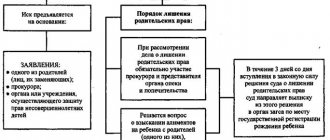How to avoid paying child support? This article is not about how to evade alimony obligations. And real cases will be considered when the amount and order of alimony can be changed, and the collection of alimony arrears is suspended.
It is important to understand that the process of freeing yourself from child support can be lengthy. Our family alimony lawyers will give you the right recommendations and solutions to the current situation.
Cancellation of child support after challenging paternity
Is it possible to completely and legally not pay child support? Of course - after challenging paternity (as well as motherhood). However, this right is granted to a citizen only within the framework of judicial proceedings.
Important : the statute of limitations, calculated as a general rule of three years, does not apply in this case.
The exceptions are:
- A case when a child is conceived not naturally, but through medical intervention - artificial insemination, surrogacy, and the parents gave their written consent to medical manipulation.
- Recognition of paternity, if the citizen was reliably aware that he is not the biological father of the child.
So, if during the trial the fact of lack of relationship was established, the next step will be to contact the registry office - it is necessary to cancel the record of paternity (after the court decision has entered into legal force).
A judicial act satisfying the plaintiff’s demands to challenge paternity and cancel the payment of alimony will be a document that is presented to the bailiffs or the employer - after which the collection will be canceled.
Important : it is impossible to return previously paid alimony amounts, except in cases where they were assigned on the basis of knowingly false documents/information.
Methods of appointment
Has your ex-husband stopped paying child support? What to do? As already said, it all depends on the circumstances.
It is worth paying attention to the fact that the form of alimony payments plays a huge role.
Today in Russia alimony can be paid:
- by oral agreement;
- due to the conclusion of a peace agreement;
- By the tribunal's decision.
Accordingly, the algorithm of actions depends on how the parents resolved the financial issue. Has your ex-husband stopped paying child support? Next, we will consider each scenario.
Transfer of property for alimony
According to the norms of the current legislation, in particular Article 104 of the RF IC, payment of alimony is possible not only in monetary terms, but in other ways agreed upon by the parties - with property. In practice, this is not so easy to implement, and not all notaries are ready to approve such an agreement.
So, if a debt on alimony obligations is collected, then it can be repaid after the sale of the debtor’s property (if this amount is greater, then it must be returned to the debtor), but if these are current payments, then payment occurs in monetary terms, on the basis of a judicial act, executive leaf.
How can property be offset against alimony payments?
This is possible on the basis of an appropriate notarial agreement concluded between the parents, but whether the notary will certify such an agreement - most likely not, since in this case the rights of the child will be violated. A car, land, apartment and other property will not be able to feed a child or provide him with other necessities.
If such an agreement (even a notarized one) is appealed in court, it may be declared invalid, as well as if, after transferring property to pay alimony, the child’s mother applies to the court with a claim to collect it, such an application will be granted.
Please note that not all property can be foreclosed on, namely:
- If this is a residential premises that is the only one for the debtor;
- A plot of land on which residential premises are located, which is the only one for the debtor;
- Transport that is used to move a disabled debtor or his disabled family members;
- Personal belongings, household utensils;
- Things that are used in work activities;
- Cattle, poultry, etc.;
- Personal items in the form of awards, prizes, orders, badges of honor;
- Coal, oil, gas, solid, gaseous, liquid fuels necessary for work;
- Food products (food), as well as seeds.
Verbal agreement and financial support
This arrangement is considered the most unsafe. The thing is that during the divorce, parents verbally discuss all the specifics of paying alimony - how much and when to allocate money. This is an unofficial method of action.
Has your ex-husband stopped paying child support? What to do? In this case, you will have to talk with your spouse. Next, offer to conclude a peace agreement and remind you of responsibility for the child. If this does not help, threaten with court and official assignment of alimony.
Some men do everything to be deprived of parental rights, believing that this will free them from child support. But that's not true. If parental rights are deprived in the future, the parent will not be able to demand child support from able-bodied adult children. But no one removes child support obligations from the child’s legal representative. You will still have to pay.
Determine the place of residence of the child with the alimony payer
If, after considering and satisfying the plaintiff’s application for alimony, the child’s place of residence changes, that is, he begins to live with the alimony payer, the obligation established by the court to pay alimony is lost.
However, this issue should again be resolved in court, that is, file a corresponding statement of claim and, if satisfied, send the judicial act to the bailiff service or the employer. In the future, the plaintiff should apply to the court with an application to collect alimony from the parent who does not take part in its maintenance, that is, violates the provisions of Article 80 of the RF IC.
Important : it is impossible to return previously paid alimony amounts, except in cases where they were assigned on the basis of knowingly false documents/information.
Peaceful agreement
Has your ex-husband stopped paying child support? Where to go? If there has been a peace agreement, it is advisable to go to court immediately. If the agreement is correctly concluded in the established form, the document will have legal force. This means that it will be possible to collect alimony through the court.
A peace agreement on the payment of alimony is concluded with a notary. This document actually duplicates the oral agreement of the spouses regarding the issue being studied, but with legal guarantees.
To conclude such an agreement, you will need to go to a notary’s office and take with you:
- agreement on payment of alimony;
- passports of the parties;
- birth certificates of all children;
- marriage/divorce certificate (if available).
It would be enough. Also, under a peace agreement, it is possible to transfer property to the child as alimony. But this is an extremely rare situation.
What happens if you don’t pay child support without legal grounds?
The current norms of Russian legislation provide for several types of liability for “defaulters”, in particular:
- Civil;
- Administrative;
- Criminal.
Civil liability refers to penalties and fines that can be recovered from the guilty party.
Administrative liability arises not only in case of non-payment of alimony, but also if the debtor has changed his place of residence, place of work, he has been assigned pension payments, and he has not informed the SSP employees about this, does not comply with the legal requirements of the SSP employees, and also provides knowingly false information to regarding your income and assets.
When brought to administrative liability, the following may be imposed on the defendant:
- Penalties – in the amount of 1-2.5 thousand rubles;
- Seizure of property and its subsequent sale;
- Seizure of bank accounts;
- Prohibition of traveling abroad of the Russian Federation.
If the debtor obstructs and/or deliberately evades the demands of the SSP employees, he may also be subject to a fine, arrest, and may also be subject to compulsory labor.
As follows from Article 157 of the Criminal Code of the Russian Federation, criminal liability arises if the debtor repeatedly evades payment of alimony and there are no valid reasons for this. In this case, the following measures may be applied to him:
- Involvement in correctional and forced labor for up to 12 months;
- Arrest (no more than 3 months);
- Imprisonment (for a period of no more than 12 months).
About the amount of payments
First, let's try to understand how much to pay in a given case. The current legislation of the Russian Federation indicates that alimony is assigned in different amounts.
For example:
- as a percentage of salary;
- in a fixed amount.
In the first case you will have to pay:
- ¼ of monthly income - for 1 child;
- 33% - for 2 children;
- ½ of income - if you have 3 or more children.
This is the minimum that each parent must contribute when making interest payments. They can be reduced, but this is extremely problematic.
In the case of fixed amounts, all income of the child support provider will be taken into account, as well as the needs of the children and the cost of living in the region of residence of the family. It is advisable to choose this option if your spouse has a “gray” salary.
Reducing alimony as an option to reduce payments
Some people are interested in how to officially avoid paying child support. This can also be implemented, but there are much fewer cases for this. A parent has the right not to make payments if it is proven that he is not the genetically related father, if the other parent who had the child is deprived of the rights to raise him, if the money is spent incorrectly and in other cases determined by law. Often only court cases regarding child support can solve the problem and change the burden of payments.
In most cases, the parent is looking for ways to avoid paying child support at all. There are three main reasons:
- change of circumstances;
- change in income;
- the birth of another natural baby.
Circumstances must get worse. For example, there has been a loss or reduction in the capacity of the person who must make the payment. This is expressed in the assignment of disability for the first two non-working groups. This means that the parent’s income changes and he needs help or care. The amount of payments may be reduced if the recipient is recognized as having legal capacity, for example, the child has reached 18 years of age and is able to earn money on his own. The situation is also considered if a teenager begins to engage in entrepreneurial activity. In the issue of child support for a parent, the grounds are similar to the given cases regarding payments in favor of a child.
There is an opinion that in relation to how not to pay child support, a situation can be considered when a second and third baby is born. In this situation, we are talking only about reducing the size of payments. For example, when there are several court orders to accrue payments upon the birth of another child, due to which the parent’s income has decreased. Whenever income decreases, we can talk about reducing the amount of alimony.
In the question of how not to pay child support to your ex, it is important to realize that we are talking about a joint child who needs care and attention. Reducing payments is another matter, because sometimes the father is not able to pay the assigned amount.
About documents for court
Has your ex-husband stopped paying child support? What documents are needed to file a lawsuit? Let us immediately consider the situation where alimony obligations have already been assigned by a judicial authority.
The list of required papers for a claim includes:
- parents' passports;
- birth certificates of all common children;
- marriage/divorce certificate (if available);
- certificate of family composition;
- calculation of the amount of alimony with justification for expenses (or writ of execution/previous court decision);
- all sources of income of the defendant (with evidence);
- a certificate from the former spouse’s place of work (or a petition to find a place of employment for the husband);
- statements indicating the presence of alimony debt;
- a certificate from the defendant’s place of residence (or a request to search for a former spouse);
- other evidence indicating evasion of parental obligations.
A similar package of documents is needed when applying to court for the initial assignment of alimony. Additionally, if there is a court order and debts, a penalty can be collected from the defaulter.









